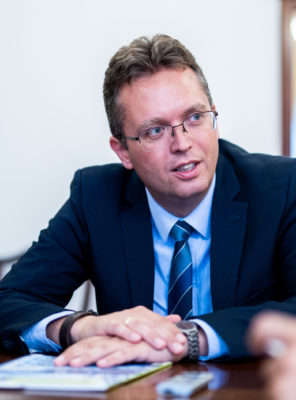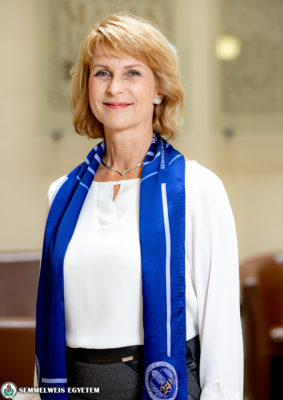 At the start of the forum, Rector Merkely recalled that Parliament passed the laws related to the model change in higher education the previous week, including the law on public-interest trust foundations. Semmelweis University will operate under the control of such a foundation as of August 1, 2021. The law also stipulates that the goal of the change is to help Semmelweis University become one of the top 100 universities in the world, and one of the top 5 medical schools in Europe. Dr. Merkely said the model change also allows for a more flexible structure, which creates the opportunity for continued development, but the goals can only be achieved in cooperation with the community of Semmelweis Citizens, as its human resources are the university’s biggest value. Therefore, regular consultations and communication such as the present forum are very important, he noted.
At the start of the forum, Rector Merkely recalled that Parliament passed the laws related to the model change in higher education the previous week, including the law on public-interest trust foundations. Semmelweis University will operate under the control of such a foundation as of August 1, 2021. The law also stipulates that the goal of the change is to help Semmelweis University become one of the top 100 universities in the world, and one of the top 5 medical schools in Europe. Dr. Merkely said the model change also allows for a more flexible structure, which creates the opportunity for continued development, but the goals can only be achieved in cooperation with the community of Semmelweis Citizens, as its human resources are the university’s biggest value. Therefore, regular consultations and communication such as the present forum are very important, he noted.

Dr. István Stumpf, government commissioner for coordinating the model change, said in his opening speech that the current change is the biggest of the past 30 years in higher education. He noted that of course the model change will not solve every problem, but will provide universities the opportunity to take off the shackles that have been holding them back, be it related to financial or compensation limits, and free up new energies compared to the overly bureaucratic current system. Under the new system, the state as controlling authority will be replaced by the foundation and its board, whose members have already been nominated by the founders.
The commissioner announced the future members of the foundation’s board, which will be led by Dr. Gábor Orbán, CEO of pharmaceutical firm Richter Gedeon Nyrt., a member of the Consistory of Semmelweis University, and a former state secretary of the Ministry for National Economy. The other members of the five-person body will be Rector Merkely; Dr. Miklós Szócska, dean of the Faculty of Health and Public Administration and former state secretary for health care; Dr. Péter Gloviczki, Professor and Chair Emeritus of the Division of Vascular and Endovascular Surgery at the US Mayo Clinic; and Dr. Róbert Bedros, chief medical officer of the Szent Imre Hospital and senior advisor to the prime minister. Stumpf stressed that the state will nevertheless remain present in the university’s operations and the financing of higher education in the future as well. He also noted that Semmelweis University is one of the few universities to receive a significant endowment from the state in the course of the model change: in this case, this will be a 5% stake in Richter Nyrt.
The government is committed to making Semmelweis one of the leaders, the most important players, the guiding post of its field within Hungarian higher education
– he said.
He also made it clear that the state remains committed to developments in higher education that universities formulated under the EU’s Recovery and Resilience Facility (RRF) in the preliminary phase for calls, but added the details of the specific financing are still being worked out and will soon be discussed by the government.
Regarding the new structure, he said cooperation between the board, which sets a strategic direction, the Senate, which represents the university’s autonomy, and the state will be important. The Senate will be represented in the controlling authority through its delegation of one member to the foundation’s supervisory board. Cooperation between the three players will determine the future at every university, with the more detailed rules and regulations to be created by August 1. He added that the foundations are expected to be registered by the end of May.

Dr. Balázs Hankó, deputy state secretary for higher education at the Ministry for Innovation and Technology, spoke about the new financing model, which will have three main pillars. In the case of Semmelweis, these will be the endowment of Richter shares, whose yield will finance developments; the ongoing Semmelweis XXI Development Program; and the framework agreement and new type of financing contract which will ensure predictable support for universities after the model change. The latter will detail quality and performance incentive indicators in terms of education, research and infrastructure, which will include, in addition to the number of students enrolled, indicators measuring scientific performance, as well as the position in international rankings, intellectual property developments, international activity, as well as the system of professional colleges.
In the second half of the forum, the participants answered questions from the audience. Dr. Stumpf noted that universities themselves initiated their participation in the model change through a vote by their Senate. Dr. Merkely said Semmelweis was the first institution among the current model changers to indicate its interest, following the support of its Senate. He recalled that after he took office, they already started looking at options to improve its operations, and the foundation-based model was one of their first options already back then. Semmelweis currently has a very high level of support from society, making it an ideal time to carry out the model change, he added.
 Dr. Hankó emphasized that there is no plan to introduce mandatory tuition or reduce the amount of state support, with the latter to be guaranteed through a long-term contract. Chancellor Pavlik said the legal change will take place as of August 1, which will result in workers receiving new contracts. (An FAQ on related issues can be found here.) Dr. Stumpf said the government will enact two rounds of 15% salary hikes, as of September 2021 and January 2022, and they also want to make possible the better rewarding of exceptional work. Adding to this, chancellor Pavlik said the university plans a differentiated wage hike among workers based on performance, and for the 2700 administrative workers especially a new system will be created to rate performance.
Dr. Hankó emphasized that there is no plan to introduce mandatory tuition or reduce the amount of state support, with the latter to be guaranteed through a long-term contract. Chancellor Pavlik said the legal change will take place as of August 1, which will result in workers receiving new contracts. (An FAQ on related issues can be found here.) Dr. Stumpf said the government will enact two rounds of 15% salary hikes, as of September 2021 and January 2022, and they also want to make possible the better rewarding of exceptional work. Adding to this, chancellor Pavlik said the university plans a differentiated wage hike among workers based on performance, and for the 2700 administrative workers especially a new system will be created to rate performance.
It will be up to the board of trustees to decide whether to further expand the university’s training programs, such as for example raising higher the number of international students accepted. R&D financing will be provided, including current plans to build Science Parks and other scientific, innovation parks and ecosystems, and current grant programs will be continued, noted Balázs Hankó.
Dr. Merkely pointed out that at every new milestone in the model change process the university will hold similar events where any questions can be raised and will be answered.
The online forum can be viewed here (in Hungarian):
Pálma Dobozi
Translation: Tamás Deme
Photo (archive): Attila Kovács – Semmelweis University


